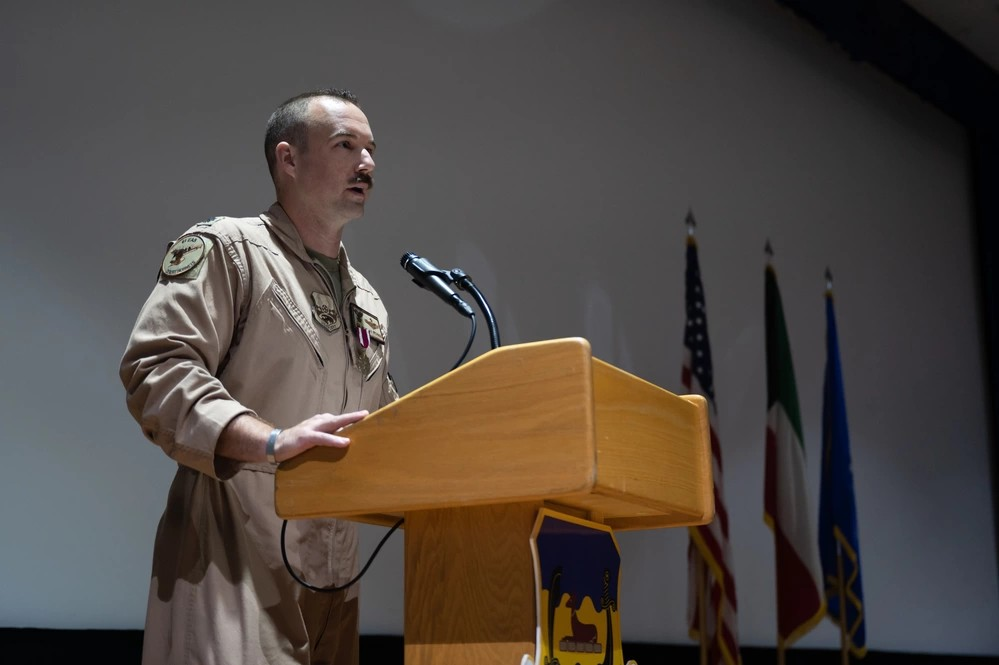How to Give a Change of Command Speech

The change of command ceremony is a special event in a military officer's career. It represents the bookends of closing one chapter in the outgoing commander's life and the beginning of a chapter for the incoming commander.
Your time in command will be one of the most challenging and rewarding times in your career and also for your family. Below I humbly offer some guidance to help you craft your speeches, advice for the incoming and outgoing commander. Use them to help you tailor your own speech.
What is the Protocol?
What do you remember from your time attending a previous change of command? Nothing? Great, now you know what most of the folks are going to think about your speech. Let's answer some of your questions below.
I have an Air Force perspective, so I can't answer if the other services do it differently. There is another great website from an Army perspective by a good friend, here.
However, from an Air Force perspective, whose day is this? It is the out-going commander's ceremony, their award presentation, and it is the incoming commander's receiving line. As such, the out-going commander who has poured their heart and soul into the previous two years gets to have the longer remarks. However, no matter your role as the incoming or outgoing commander, make it short and sweet and move on.

What do I say?
I'm the Out-going Commander, What do I say?
You have great latitude here. No one wants a long ceremony. Your speech should last no more than 10 minutes. There is a twist on the J.A. Konrath quote, "If you can't be smart or funny, be brief." For giving speeches, "Be funny, be brief, be gone. But if you can't be funny--be brief."
Humor will instill in the audience the grace to entertain your speech for a bit longer, but not much. Also, you are not a stand-up comedian, you are a commander. This is your chance to express gratitude and perhaps some wisdom with humor, not the other way around. Gratitude is the order of the day. It is a privilege to lead others and for them to be in your care. Even if it was difficult, you will likely be someone they never forget.
I remember all of my commanders, although some had less impact than others. However, none of their impact came from their change of command speech, either incoming or outgoing.
Some thoughts to consider:
- Thank the distinguished visitors and the leadership for their attendance. Use names as appropriate. Do not forget to identify and thank General Officers in attendance as they have taken time out of their schedule to honor the office you occupy and your service.
- Thank the unit for their efforts
- Do tell stories from the unit to illustrate your points (adversity, tragedy, levity), incorporate or leave names anonymous as appropriate.
- Do not forget to thank your spouse. I have too many stories from Colonel and General Officer spouses who point out they were forgotten in the speeches.
I'm the Incoming Commander, What do I say?
The incoming commander has the easiest speech. It should take no more than 4 minutes.
It is five Thank You's and a Transition:
- First, thank the distinguished visitors and special guests in attendance.
- Second, thank the person who hired you. You wouldn't really be there if it wasn't for them. It is a privilege to lead others and they made it happen.
- Third, thank the out-going commander for their leadership and their hospitality.
- Fourth, thank those who helped make the ceremony happen. This would be the project officer who organized the ceremony, proffers, secretaries, and those who helped decorate for the event.
- Lastly, thank your family. If your parents are in attendance, it would make sense to thank them for their efforts in raising you and instilling in you the values and behaviors that have made you successful.
Thank your children, because they likely had to move and have moved a number of times. Their sacrifice, albeit unwillingly for some, is important to acknowledge. Our children have a burden put upon them as being "The Commander's Kids" with increased scrutiny at a time when they are making mistakes trying to figure life out. It is similar, although arguably less scrutinized, to a pastor's children.
Save your spouse for last. They are going to be a close confidant, an encourager, a truth-teller, and a family stabilizer. You will work long hours, with late night interruptions and they will be the one to keep the house together. A pre-emptive thank you for their sacrifices is always warranted. This is a baseline and not to mention if they had to give up a successful career, certification, schooling, or family to follow you around the globe to support you in your leadership role. Although spouses are not in uniform, they serve the country in pretty profound ways and with mostly thanklessness from the Air Force.
One quick story on the benefit of leadership spouses. It was my Group Commander's wife who babysat my first-born son during a time of my wife transitioning out of the service. It was another leadership spouse who helped my wife after she went back into the hospital days after having our son. It is their kindness, now more than a decade later, that we still have eternal gratitude.
- After the five Thank You's, you need a transition to get off stage. It is awkward if you simply say thank you and walk away. There needs to be a transition for what is next: the work. One practical suggestion is to say you look forward to working with everyone, or getting to work, or that you hope to meet everyone in the coming days.
That's it!
Shouldn't the Incoming Commander lay out expectations or give the troops insight into how you lead?
No. This is not the point or the forum. You can save that for a Commander's Call you will have in the next 30 days after you have a clue what is going on in the unit. You still shouldn't think you know everything after those 30 days. You will hear rules of thumb spanning 60-120 days before you understand the unit or units well enough to decide where to focus. This is the subject of another post.
Bottomline: This is a ceremony honoring the out-going commander; pay respect and gratitude for the honor you have been given and then exit the stage.
I wish you well during your command and your next endeavor.
If you want to keep growing as a leader, then drop your email below and get the insights you need to help you on your journey!
Additional Resources
Change of Command Sample Script
The appearance of U.S. Department of Defense (DoD) visual information does not imply or constitute DoD endorsement



Member discussion